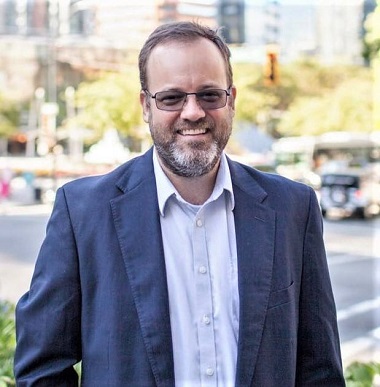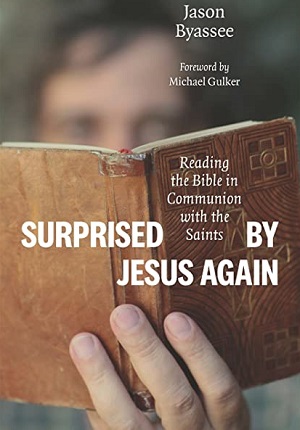
Jason Byassee will speak about ‘Surprised by Jesus Again’ with the Newman Association at UBC this week.
How do we read the Bible?
And how do we speak well about God?
Those two questions encompass almost everything I write, teach or say. And they are the twin foci of Surprised by Jesus Again: Reading the Bible in Communion with the Saints.
To answer them I draw on the church’s earliest witnesses in its first few centuries, especially Mary of Nazareth, Origen, Augustine and Gregory the Great.
And I draw on folks I know now who are walking around above ground. If you are as nerdy as I am, this will help – I think of myself as a professor of patristics and journalism.
If you’re a civilian or more-normal-person: I listen to saints living and dead for wisdom about God and the world now.
I argue that we must pay attention to the specific God we have: revealed in Christ, moving among us by the Holy Spirit. There is no God in general – God always gifts God’s self to us in mediated ways, through wine, water, word, one another, perhaps especially the enemy.
And there is no neighbour in general: we must know folks around us by name, know their kids’ names, know their worries and delights. Origen convinced me that the depth and care with which we attend to the Bible, and the love and curiosity with which we attend to the neighbour, tend to rise or fall together.
If we pay attention well to God in Scripture we will pay attention well to the face of the other person, and vice-versa. If not . . .
The ‘community as witness’ is a key theme in Christian theology, and it is a critical component of reading Scripture well.
I argue in the book that God is Jewish, Catholic and Pentecostal. Notice the trinitarian pattern: God keeps his promises to his chosen people Israel (Father), God meets us through saints living and dead (Son) and God is alive and working on the edges in ways that disquiet and inspire (Spirit).
I show this by demonstrating how I’ve learned from specific Jewish, Catholic and Pentecostal friends. But this is not really an ecumenical or interreligious claim.
It is a claim about God in Christ wedding himself to the particular, keeping promises, making stubborn people like us holy. The drama that takes place when we read is that we are constantly trying to avoid an encounter with the true God. We try to remake God the way we would like.
But God, in Christ, patiently undoes our resistance, and meets us in grace and love. As preachers and teachers of the Bible we enter into Christ’s own reading of his Bible, as he ushers in the coming kingdom through and in spite of us.
And the way he involves us in his saving work of the whole cosmos is through our delight. We notice what delights others. As teachers and preachers, others notice what delights us. Think of the best teacher you had – you were attracted to her delight, right? What delights them won’t necessarily delight us, but we will notice it.
So as teachers we must see that we delight in Christ, and the new creation he is bringing, and the scriptures that attest to him, and all of his weird friends. And we must delight in the intricacies of his world.
It is hard work to expect to be surprised (usually the expectation ruins the surprise). But as we read the Bible well, this is what happens. We don’t expect to see Jesus there. Then, despite our resistance, there he is, drawing us toward himself and others. We’re not surprised by who meets us, that’s clear – it will be God in Christ. We’re surprised by how he does so this time. And we will be changed, transfigured.
 My hope is that those who seek to read the Bible will have that vocation renewed through this book. I conclude with some thoughts on the ways discovering Christ in Scripture and Christ in creation intertwine with one another.
My hope is that those who seek to read the Bible will have that vocation renewed through this book. I conclude with some thoughts on the ways discovering Christ in Scripture and Christ in creation intertwine with one another.
Jason Byassee (@jasonbyassee) holds the Butler Chair in Homiletics and Hermeneutics at Vancouver School of Theology. He is also a contributing editor at Christian Century magazine and the author of several books, including Praise Seeking Understanding: Reading the Psalms with Augustine.
Surprised by Jesus Again received many good reviews, including from the likes of Stanley Hauerwas, Mark Noll, Janet Soskice and Fleming Rutledge.
Byassee will speak on his book and related themes with the Newman Association of Vancouver at St. Mark’s College on the UBC campus this Friday (March 13).
This comment is re-posted by permission from the Eerdword site.

Will this be recorded and available for those who cannot attend?